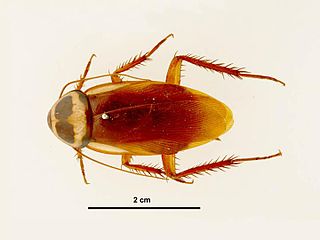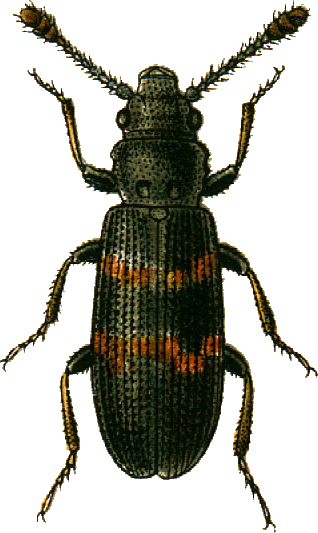
The soldier beetles (Cantharidae) are relatively soft-bodied, straight-sided beetles. They are cosmopolitan in distribution. One of the first described species has a color pattern reminiscent of the red coats of early British soldiers, hence the common name. They are also known commonly as leatherwings because of their soft elytra.

The Australian cockroach is a common species of tropical cockroach, with a length of 23–35 mm (0.91–1.38 in). It is brown overall, with the tegmina having a conspicuous lateral pale stripe or margin, and the pronotum with a sharply contrasting pale or yellow margin. It is very similar in appearance to the American cockroach and may be easily mistaken for it. It is, however, slightly smaller than the American cockroach, and has a yellow margin on the thorax and yellow streaks at its sides near the wing base.

Carl Henrik Boheman was a Swedish entomologist.

Omorgus is a genus of beetles of the family Trogidae with about 140 species worldwide. Omorgus beetles are generally between 9 and 20 mm long.

Harpalus is a genus of ground beetle first described by Pierre André Latreille in 1802.
The Canthyloscelidae are a small family of midges closely related to the Scatopsidae.

Clivina is a genus of ground beetle native to the Palearctic, the Nearctic, the Near East and North Africa. There are more than 600 described species in Clivina.

Hygrobia is a genus of aquatic beetles native to Europe, North Africa, China and Australia. It is the only genus in the family Hygrobiidae, also known as the Paelobiidae. These are known commonly as squeak beetles or screech-beetles.

Phloeostichidae is a family of beetles in the superfamily Cucujoidea. They are typically found under the bark of dead trees. Larvae have been found to consume plant tissue and some fungi, while the adults appear to be exclusively fungivores. The family contains four extant genera, Phloeostichus is native to the Palearctic, Rhopalobrachium is native to central-southern South America and eastern Australia, Hymaea is native to southeastern Australia, and Bunyastichus is found in Tasmania.

Acmaeodera is a genus of beetles in the family Buprestidae, a group of metallic wood-boring beetles favored by insect collectors. Whereas most beetles including most buprestids fly with their elytra held out and vibrating their hindwings to give lift and thrust, Acmaedodera, however, fly with their hind wings only — the elytra are fused down the center and form a shield over the insect's abdomen, even during flight. This fact, combined with the banding across the abdomen which is common in this family, gives many of them a distinct wasp-like appearance when in flight. Several are therefore considered hymenopteran mimics.

Amblystomus is a genus in the beetle family Carabidae. Its species are found mainly in Africa, Asia, Europe, and Australia.

Craspedophorus is a genus in the beetle family Carabidae. There are more than 160 described species in Craspedophorus.

Abacetus is a genus of beetles in the family Carabidae, distributed across Africa, Asia and Australia, with a single European species. It contains the following species:

Harpalus australasiae is a species of ground beetle in the subfamily Harpalinae. It was described by Dejean in 1829.

Sphenophorus is a genus of weevils, often known as billbugs, in the family Curculionidae, and tribe Sphenophorini. Eleven species of billbugs infest managed turfgrass in North America.

Aspidimorpha is a large Old World genus of beetles belonging to the family Chrysomelidae and tribe Aspidimorphini. The genus name is frequently misspelled as "Aspidomorpha", due to an unjustified spelling change in 1848.
Clivina vulgivaga is a species of ground beetle in the subfamily Scaritinae. It was described by Boheman in 1858.

Stenotarsus is a genus of handsome fungus beetles in the family Endomychidae. There are more than 50 described species in Stenotarsus.

Parisopalpus nigronotatus, known by its common name, the spotted lax beetle, is a species of false blister beetles. It was first identified by Carl Henrik Boheman in 1858, under the name Nacerdes nigronotata. Native to eastern Australia, the species was introduced to New Zealand in 1931.

















